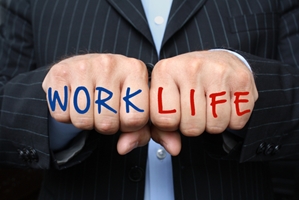
Striking the right work-life balance is a tall task, indeed, but once it's achieved, all the money in the world couldn't knock off employees from this pleasant pedestal. But as it happens, a substantial percentage of Americans say that they've reached this healthy equilibrium, according to a recently released survey.
Roughly three-quarters of full-time working Americans – 77 percent – consider their work-life balance to be in "good" or "very good" shape, a new poll from Robert Half shows. It's particularly better than it was back in 2012, as 45 percent said that they considered their work and personal life to be more balanced now than it was then.
The same can't be said for business owners, however, or those who are in positions of authority. Only 1 in 5 C-suite executives – 22 percent – believed they were effectively occupying the middle ground between work and life outside the office.
Paul McDonald, Robert Half senior executive, noted that there's no concrete definition of what makes day-to-day living conditions symmetrical
"Work-life balance can have different meanings for different people," McDonald explained. "For some, leaving at 5 o'clock every night is the ideal, and for others, scheduling flexibility and remote work options offer the greatest benefit. Employers today are introducing more flexibility in how, when and where work is performed, and employees are reaping the rewards."
He added that employers might want to hone their focus on how to mine the middle ground because workers who achieve this enviable position are more likely to stay loyal, as opposed to looking for greener pastures someplace else.
Better to have balance than money, some say
Because of its desirability, a healthy work-life balance is something many Americans are putting at the top of the preference pole when it comes to what they most want out of their job. In a survey of 1,000 full-time and part-time employees conducted in November, 45 percent of workers pointed to this as their uppermost priority, with compensation coming in a distant second at 33 percent.
That's not the case for everyone, however, as the almighty dollar can be a compelling incentive, both in employee benefits form and take-home pay. Even here, though, workers who are engaged – i.e. genuinely enthusiastic about what they do for a living – can't be swayed from their propitious perch, a newly released survey from Gallup reveals.
Disengaged more likely to quit for higher pay
Approximately one-third of employees say that they would willingly leave their current employer if they were given a raise of 20 percent or more someplace else, Gallup found. This was found among those who considered themselves to be engaged employees.
It's a much different story for those who don't feel connected at the workplace. More than half – 54 percent – said a 20 percent increase in pay would be enough to jump ship.
"The bottom line is that money matters and all workers want to be paid competitively," wrote Brandon Rigoni, Gallup's associated director for selection and development, and Bailey Nelson, an editor and writer at the polling firm. "But to employ the smartest salary strategy, leaders need to go beyond increasing pay. By ensuring that workers are fully engaged and by focusing on holistic employee well-being, leaders can meet the needs of their employees, encourage them to stay and improve organizational performance."





